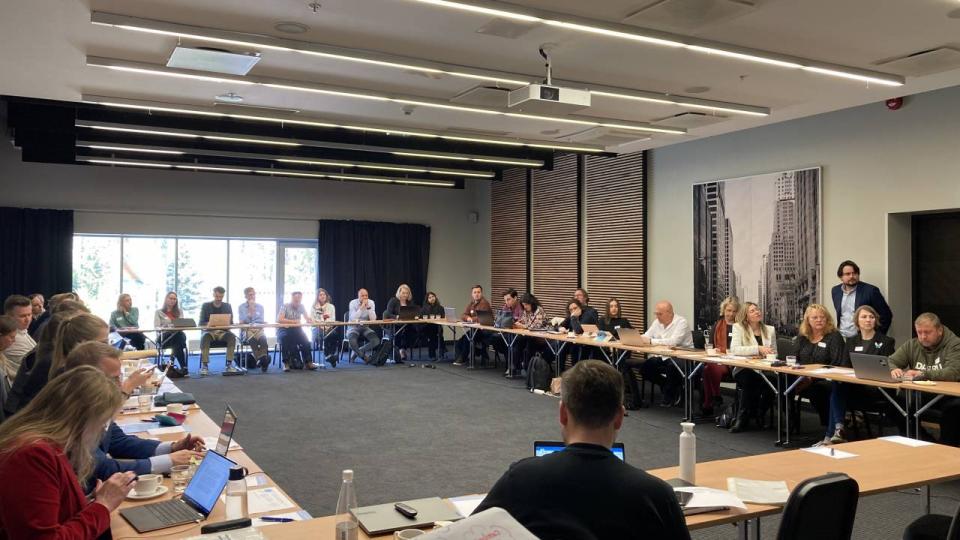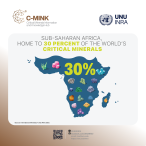The year is almost half-way through, and activities at the UNU-FLORES Weißwasser branch are in full swing. Here is a recap of our most recent work in the region
Franziska Stölzel reports:

UNU-FLORES Weißwasser Branch Hosts Delegation from Exchange EU Program
March 13 and 14 saw a range of stakeholders and advocates for sustainable energy and infrastructure welcomed to Weißwasser by UNU-FLORES on behalf of the European Commission’s Exchange EU Program.
The ExchangeEU Program aims to provide opportunities for coal, lignite, peat, and oil mining (coal+) regions to share their individual experiences with other regions undergoing energy transition. These peer-to-peer experiences are intended to facilitate long-term connections to support clean energy and just transition across different countries in the European Union.
As part of the Institute’s ongoing mission to support the Lusatian region as it undergoes this transition, this delegation was warmly received in Weißwasser to strengthen communication and cooperation between the coal mining regions of on both the Polish and German sides of Lusatia.
An important partner of UNU-FLORES in this event was Zklaster, a company based in Zgorzelec, which offers sustainable energy supply in the areas surrounding the Turów open-cast mine and shares UNU-FLORES’ goal of improving cooperation in the field of structural change. The result of this partnership was two days of exchange on the overarching topic of recultivation projects and sustainable infrastructure.
On the first day, ideas and visions for the sustainable energy supply were collected and internalised through visualisation- boards, before participants visited a number of important structural change projects in Weißwasser to develop concrete ideas as to how the city can generate sustainable energy through photovoltaic systems. Mayor Pötzsch explained that a lack of available land posed a considerable obstacle in energy generation, which currently would mean that large forested areas would need to be cleared and cultivated as compensation areas.
To overcome this barrier, the stakeholders proposed that the the large buildings in Weißwasser be utilized, with PV systems installed in existing built-up areas.
To understand the enormous intrusion of mining into nature and the opportunities that could stem from reclamation, the delegation observed the lignite mining pit and spoke with the Head of Recultivation from the local coal mining company. Mining laws in Germany are strict, declaring that every square metre allocated to mining be rejuvenated. Therefore, the core of the city’s lignite mine will become a nature protection zone, while the southern facet of the mine is partially already used for military purposes. The planned gigawatt factory – a PV project of the coal company LEAG – will also find space in the former opencast mine.
Afterwards, a visit to the the Findlingspark Nochten took place; this is a park located on the former the coal mining power plant that features lakes, buildings, and plants cultivated from the Scandinavian stones of the Ice Age. This Park offered a prime example of a successful recultivation project and stimulated many inspiring ideas for other tourism attractions from the visiting delegation.
The final stage of the exchange was a workshop held on the topics of reclamation and the energy cluster. This workshop saw stakeholders from Poland and Germany come together to discuss the tasks involved in the cooperation. It quickly became clear that although there is a huge potential for collaboration, there is currently limited capacity on either side to implement the ideas developed. To alleviate this, further plans have been made to establish an energy cluster in Weißwasser, which will be presented at an information event in the summer.
This exchange has demonstrated both the differences and commonalities of both sides of the Lusatian region in relation to the coal phase-out, while promoting the shared appreciation for the efforts behind the energy transition.
![MicrosoftTeams-image-30-620x413[1].jpg](/sites/default/files/styles/16_9_large_no_crop/public/2024-04/MicrosoftTeams-image-30-620x413%5B1%5D.jpg?itok=0oqX5Xsd)
UNU-FLORES & Weißwasser represented at International Conference in Estonia
To facilitate international cooperation on emerging issues in energy regions, the CINTRAN Project hosts an international conference twice a year. At this conference, stakeholders from academia and research, the private sector, and the authorities of different coal regions can exchange ideas and their unique experiences. In May, 40 people from all over Europe – including UNU-FLORES’ Franziska Stölzel – gathered to Ida-Viru, a region in Estonia where energy is produced by oil shale. Over two days of meetings, updates to the CINTRAN Project were presented and discussed, along with best practice examples from the regions, followed by workshops on the Project’s adaptation. After a visit to the oil shale facility, the participants were able to work on joint project ideas and identifying synergies.
According to Franziska, this conference was an ideal meeting point for coal mining researchers and energy stakeholders all over the world to exchange knowledge to advocate for a fair and just energy transition – which affects not only those working and living in the region and/or industry, but is also connected to many social and cultural topic, such as social security and quality of life. Conversely, we can also see firsthand many climate-related issues spanning Europe – which calls for more intense and faster action to reduce CO2 emission, and therefore, it is important that these stakeholders from both sides are supported throughout transition measures.
On behalf of UNU-FLORES, we would like to thank all those involved and look forward to future collaborations on this very important topic.
![MicrosoftTeams-image-29-1024x720[1].jpg](/sites/default/files/styles/16_9_large_no_crop/public/2024-04/MicrosoftTeams-image-29-1024x720%5B1%5D.jpg?itok=VCFCppA2)
For more information on our work in Weißwasser, please reach out to Franziska Stölzel (stoelzel@unu.edu)




